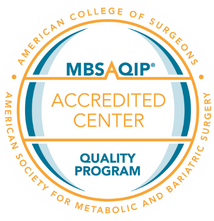Overlake Medical Center Again Achieves Accreditation from the Metabolic and Bariatric Surgery Accreditation and Quality Improvement Program®
The Puget Sound–area center meets all criteria as a MBSAQIP-Accredited Center, according to national quality standards established to deliver safe, high quality metabolic and bariatric patient care.

Patients seeking surgical treatment for obesity and its related conditions have a high-quality choice for receiving care at a nationally accredited program that meets the highest standards for patient safety and quality in the greater Puget Sound area.
Thien Nguyen, MD, director of metabolic and bariatric surgery at Overlake, today announces that its bariatric surgery center has again been accredited as a Comprehensive Center by the Metabolic and Bariatric Surgery Accreditation and Quality Improvement Program (MBSAQIP®), a joint Quality Program of the American College of Surgeons (ACS) and the American Society for Metabolic and Bariatric Surgery (ASMBS).
The MBSAQIP Standards, Optimal Resources for Metabolic and Bariatric Surgery, ensure that metabolic and bariatric patients receive multidisciplinary medical care, which improves patient outcomes and long-term success. MBSAQIP-Accredited centers offer preoperative and postoperative care designed specifically for patients with obesity. Overlake has been recognized as an accredited center since 2010.
“At Overlake, we are proud to be one of the highest-volume bariatric centers in the state with many accreditations and awards,” says J. Michael Marsh, CEO of Overlake Medical Center & Clinics. “This accreditation recognizes our comprehensive care and exceptional patient outcomes. It is a testament to the dedication of our entire metabolic and bariatric team, who work hard to deliver remarkable care to our patients. I thank them for their commitment to our community and congratulate them on this significant achievement.”
Overlake’s commitment to quality care begins with expertly trained staff and the leadership of an experienced bariatric surgeon. The program is tasked with continuous review of surgical data as they continue improving the structure and outcomes expertise necessary to provide safe, efficacious, and high-quality care to all metabolic and bariatric patients.
To earn MBSAQIP Accreditation, Overlake met essential criteria for staffing, training, facility infrastructure and patient care pathways, ensuring its ability to support patients with obesity. The center also participates in a national data registry that yields semiannual reports on the quality of its surgical outcomes and identifying opportunities for quality improvement. The MBSAQIP Standards, Optimal Resources for Metabolic and Bariatric Surgery, are published by the ACS and the ASMBS.
“Overlake’s comprehensive metabolic and bariatric surgery program provides our patients with the care and support they need to help them reach their weight-loss goals,” says Dr. Nguyen. “This accreditation gives patients reassurance that Overlake is committed to providing safe, high-quality, patient-centered care.”
After applying for MBSAQIP Accreditation, centers undergo an extensive site visit by an experienced bariatric surgeon who reviews the center's structure, processes, and clinical outcomes data. Centers that earn accreditation are awarded a specific designation level, depending on how many patients it serves annually, critical care capabilities, the types of procedures provided, and whether it provides care to patients under the age of 18.
The Centers for Disease Control and Prevention (CDC) estimates about 93 million adults in the United States are affected by obesity and that number continues to increase. The disease of obesity increases the risks of morbidity and mortality because of the diseases and conditions that are commonly associated with it, such as Type II diabetes, hypertension, cardiovascular disease, and cancer, among other health risks. Metabolic and bariatric surgery has proven to be effective in the reduction of comorbid conditions related to obesity.*
Working together, the ACS and the ASMBS have developed accreditation standards for metabolic and bariatric surgery to assist patients with obesity in identifying centers that provide optimal patient care.
*Buchwald H, Avidor Y, Braunwald E, et al. Bariatric Surgery: A Systematic Review and Meta-analysis. JAMA. 2004;292(14):1724-1737. DOI:10.1001/jama.292.14.1724.








